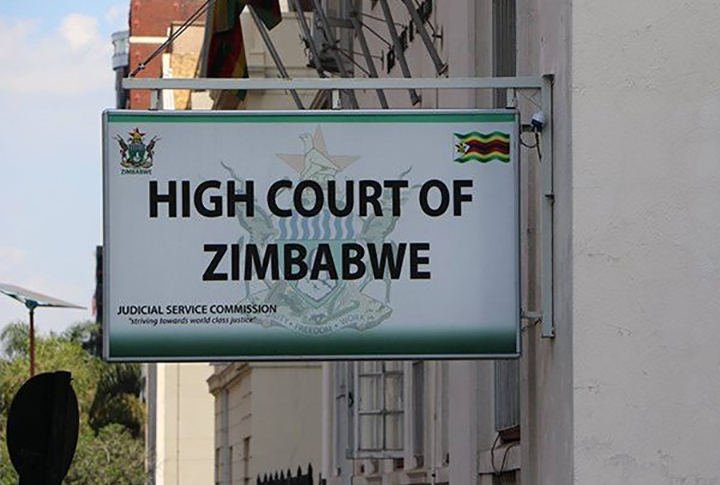Bulawayo High Court Judge, Justice Naison Chivhayo, has urged the State to expedite the trial concerning the alleged brutal murder of Paul Munakopa, who was fatally shot by two Zimbabwe Republic Police officers and two members of the neighbourhood watch committee.
Justice Chivhayo called for urgency to ensure the case reached a timely conclusion.
He noted that the case had already been delayed and called on the State to complete the necessary procedures to enable its progress.
The accused, two police officers, Bigson Nyoni and Langton Makonye, along with neighbourhood watch committee members Ross Johnston and Kyle Bennet, face murder charges in the death of the then 34-year-old Munakopa.
Nyoni and Makonye are represented by Kholwani Ngwenya of T J Mabhikwa and Partners, while Prince Butshe-Dube of Mathonsi Ncube Law Chambers represents Johnston and Bennet.
Munakopa allegedly died from gunshot wounds sustained during a high-speed chase and shootout that occurred during the COVID-19 lockdown in May 2020.
Trial proceedings began in October 2024, but the case has stalled as the State has yet to present the postmortem report as an exhibit.
Defence attorneys raised concerns over discrepancies in the postmortem report, pointing out that the listed date predates the victim’s death by three days and questioning the author’s qualifications. Lawyers requested that the State clarify these issues before admitting the report as evidence.
In a previous hearing, the court directed the State to bring in a doctor to confirm the postmortem report’s content. However, the State reported that the doctor had returned to his home country, Cuba, and proposed finding another doctor. On Tuesday, the State informed the court that the substitute doctor was overwhelmed with work and requested permission to submit written responses to queries instead.
Ngwenya objected, insisting that the doctor testify in person as the court ordered. He argued that the State had not provided evidence to substantiate its claim that the doctor was unavailable.
“My Lord the allegations faced by the accused persons are very grave. If convicted, they may face a lengthy sentence in prison. We cannot be leading evidence from the bar, if the State wants to come and present its allegations here, it must bring accompanying evidence to substantiate its claims,” Ngwenya said.
“The State just told us that the doctor who was supposed to come here is overwhelmed, but there is no letter from either the doctor himself or from the institution where he works. If he can have time to respond to questions in writing, how can he fail to have time to come to the court as per order?”
Justice Chivhayo acknowledged the doctor’s time constraints, noting that only two pathologists currently serve Mpilo and UBH hospitals, with one out of the country.
“The State explained that at the moment only two pathologist doctors are serving Mpilo and UBH. One of which is out of the country at the moment, which leaves us with one. If given written inquiries, he can respond to them during his spare time, might even be at night. But that flexibility does not apply to the court, have you considered that?”Justice Chivhayo responded to the lawyer.
Butshe-Dube suggested that the state consider other approaches, such as obtaining hospital records to verify dates and consulting the Medical Professional Council of Zimbabwe regarding the doctor’s qualifications.
“The State could at least obtain records from the health institution which will clarify the date issue, when he was admitted to the hospital, when he died and when the postmortem was conducted. Then the aspect of qualifications does not however require a doctor. Medical professionals are registered with the Medical Professional Council of Zimbabweans per the Health Professions Act,” he said.
“A document of proof from the council would suffice to prove the author’s qualifications. In any case, his qualifications should be with the ministry of health because the foreign doctors come here through the provisions of bilateral agreements between Zimbabwe and their countries of origin.”
Butshe-Dube further noted that the progress of the matter should not be stalled by the unavailability of one doctor, but could seek the expertise of any other doctor who has the capacity to comment on the matter.
“I also note that the court did not order a specific doctor to come, any doctor who has sufficient expertise to explain the contents of the postmortem can come and testify. An administrator from the issuing institution can come and testify. Failure to which this court will be left with the task of nitpicking what the State wants from the postmortem submitted in this court,” he said.
“For example, the court will then be required to choose the date of the postmortem, as it appears on the report, it was documented before the death of the deceased. An affidavit cannot be amended as per the wishes of the state. There has to be adequate evidence based on which the court can then decide when the postmortem was carried out. The court must justify its evidence in accordance to the records of the hospital.”
Justice Chivhayo urged the State to address the concerns raised by the defence counsel and explore the alternatives suggested to ensure progress on the matter.
“This case happened a long time ago and by now it should have been concluded. There are various channels that the State can use to obtain the information that is requested by the defence. There are emails, phones or fax services that can be used to have information,” he said.
“The State needs to try out these avenues so that we can make progress. We can not afford to stall this much over an issue that can be resolved. I am saying this because this matter needs to be concluded. It must be concluded.”

